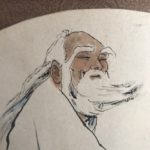I have so many fond memories of Saudi Arabia. I worked for almost 25 years in Saudi Arabia for the Saudi Arabian Oil Company. It was called Aramco when I joined the company in 1979. Here is a story about “rug fever” and a wonderful life lesson from a most unlikely source. For those who have never contracted “rug fever,” it is the “uncontrollable desire to own many oriental rugs and carpets.”
The year was 1983, and I had just returned from a developmental assignment in Udhailiyah, working for Southern Area Producing in maintenance. My good friend, Brian Dunloy, had become a collector of oriental carpets, and he invited me to take a Thursday morning trip to Dammam to meet Haji Wali Parwani, his new friend in the world of carpets. Wali was a rug merchant who had discovered that financing his Hajj trips by selling carpets could become a lucrative business for him and later for his son, Dhurma Mohammed, who opened the Afghan Carpet Center in Al Khobar on the aptly-named Pepsi Cola Road.
If memory serves, I met Wali and two of his helpers, Khoramshah and Ahmed, on that morning. Wali and Khoramshah were both short, built like beer barrels, and physically strong. Both had a wonderful sense of humor, especially Wali. He was a natural-born salesman. Ahmed was sort of a carpet sales apprentice and a go-fer for Wali.
Wali’s Dammam shop was spacious and contained two showrooms with large carpets stacked flat in big piles and smaller pieces rolled up and leaned against the walls. Wali specialized in Afghan rugs and carpets with a few Persians thrown in. The myriad colors and the many stacks of carpets made the shop look both magical and mysterious when I first walked in with Brian.
Wali and Khorramshah threw many carpets for me that morning, and I was hooked, as “rug fever” hit me. I became a passionate collector of carpets from that day. I purchased two matching small Sarukhs or twins as they are called in the trade, a large traditional Afghan Bokhara, and a Qum carpet that had an unusual Chinese motif. I still have those four carpets in my Reno condo and many more besides. Wali’s sales strategy was to let customers take the carpets home to see how they looked in their homes. If customers did not like the carpet or rug when they got it home, they could bring it back. I suspect that most of his customers kept their carpet finds. I did mine, except for one large blue Sarukh that exceeded my budget at the time, and I reluctantly returned it.
Wali and I hit it off right from the start, and we became friends. We remained friends until he left Arabia, and his son took his place. His shop became my Thursday morning destination every weekend after that first day. Wali and Khoramshah taught me about the various carpet designs and guls, the productions from various tribal regions, how to count knots, and so much more. I even started selling carpets for Wali when there were too many customers for him to handle. Wali always threw his carpets inside his shop. I always took the carpets I was selling outside and displayed them on the sidewalk in the sunlight to show off their magnificent colors and designs. I remember selling one gold carpet that was spectacular. As it sparkled in the daylight, I regretted that I had not bought it myself. Such is the extraordinary pull of “rug fever.”
I became quite good at selling carpets, not with the good-humor and bonhomie of Wali, but certainly quite skillful and knowledgeable. Soon after that, Wali began giving me a discount of ten percent on all the carpets I purchased. I thought he was rewarding me for helping him sell carpets. I was later to find out I was entirely mistaken.
One day while I was selling carpets in the shop, I heard Wali offer a first-time customer the same discount of ten percent that he gave me. I was somewhat surprised, but I said nothing at the time. When we closed the shop for the noon prayer, I decided to ask Wali about it. I started by asking him if I were his friend. He responded by saying that I was his great friend and that his shop was my shop. After Wali went on for a bit more, I asked him that if I were his great friend and this was my shop, why did he give the same discount to the new customer as he did me. He looked at me with a twinkle in his eye and said to me. Mr. Andy, you are my great friend, and this is your shop, but, remember, this is business. I laughed out loud, and we toasted one another with hot tea. That was a wonderful lesson for me that I have never forgotten: “You are my friend, but this is business.” I still laugh when I tell that story to friends and business associates here in the States.
Outbound Link to The Asian Antiquarian: https://theasianantiquarian.com/
Internal Link to A Hub of Blogs: https://whitebeardwisdom.com/


Beautiful article and wonderful memories.
What a great article. As you know I have many carpets myself from when I lived in Iran and then Afghanistan. I wish that you had told me of your THURSDAY TRIPS. I would have loved to go with you. And thanks for the office framed saddle bag then you were able to will to me until I left Dhahran as well.
On political articles — they are only “safe” to write until the next revelation breaks. I remain silent.
Robert,
Thank you. Collecting carpets is a wonderful hobby of sorts, but it can be expensive. The resale market has tanked though. The Boomers are downsizing and Generations X, Y. Z would rather go to Burning Man and Woodstock II.
As to the political posts, I will take you off the global directory for them. No worries.
Stay well and Happy New Year!
Best regards,
Andrew